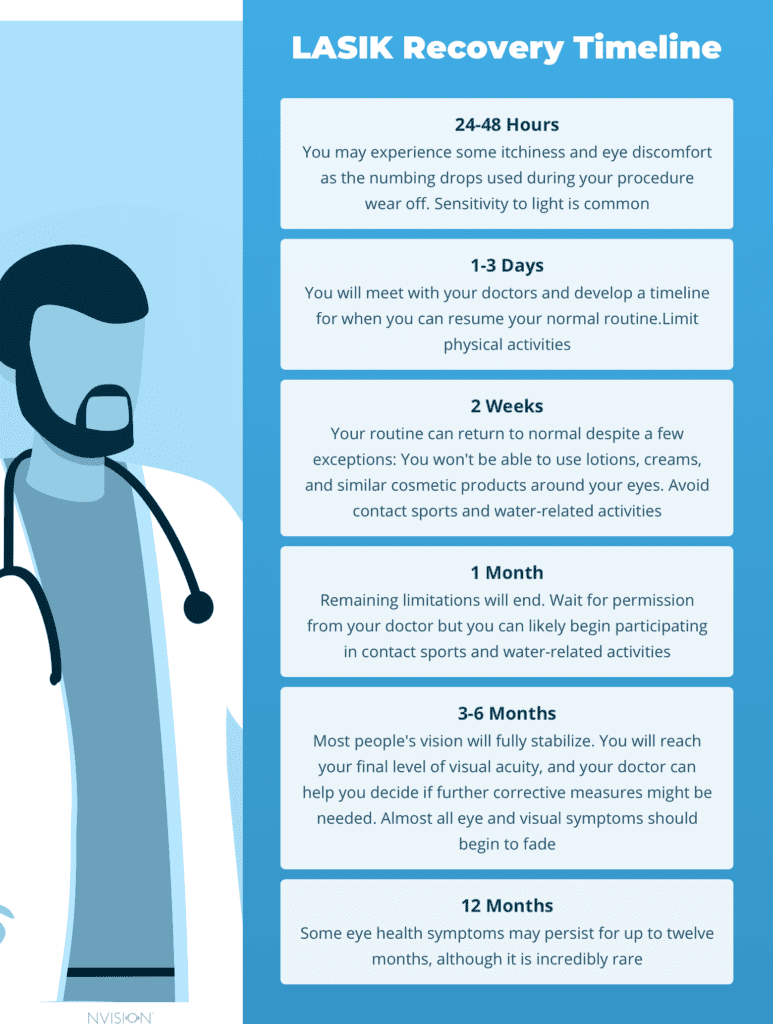
Medically Reviewed by Jonathan Pirnazar, M.D. NVISION Surgeon
LASIK Recovery Time: Healing and What to Expect
Last Updated:

Medically Reviewed by Jonathan Pirnazar, M.D. NVISION Surgeon

Article At a Glance
LASIK recovery is typically swift, with many patients noticing improved vision within 24 hours. Common temporary side effects include mild discomfort, dry eyes, and light sensitivity. Most individuals can resume normal activities within a day or two, though complete stabilization of vision may take up to six months. Adhering to post-operative care instructions and attending follow-up appointments are crucial for optimal healing and visual outcomes.
As soon as your LASIK procedure is complete, your eyes begin to heal. The American Academy of Ophthalmology says most people can return to regular activities (including driving) the day after the surgery.
Your tissues keep healing for several weeks, and you may have recovery limitations (including a ban on contact sports) for four weeks after surgery.
Your full recovery time frame can vary. Paying close attention to aftercare instructions can ensure that you heal as quickly as possible.
How Long Does It Take to Recover from LASIK?
Full LASIK recovery takes between three and six months. You will notice your vision gradually improving during this time. But most people see an immediate improvement in their vision 24 hours after the procedure is complete.
Several factors could impact your recovery time after LASIK surgery, including the following:
You deserve clear vision. We can help.
With 135+ locations and over 2.5 million procedures performed, our board-certified eye surgeons deliver results you can trust.
Your journey to better vision starts here.
- Severity: Strong prescriptions require more tissue removal during LASIK. You’ll need longer to heal if your surgery was significant.
- Age: Older people need more time to heal than their younger counterparts.
- Genetics: Some people heal quicker than others do. If you typically heal slowly after an injury, you’ll need more time after LASIK too.
A typical day-to-day recovery timeline involves mild discomfort within 24 to 48 hours, with gradual improvement for three to six months following surgery.

What to Expect in the First 24 Hours of LASIK Recovery
If you feel any discomfort after LASIK, it’s often during the first 24 hours. Your eyes may itch, burn, or feel very dry. Your vision may fluctuate, allowing you to see clearly one moment but not the next. These side effects are common, expected, and often resolve as your eyes heal.
LASIK success rates are incredibly high. More than 90 percent of patients achieve 20/20 or better visual acuity, and 99.5 percent achieve 20/40 or better vision. If your vision seems blurry right after surgery, try not to worry. Things will improve as your eyes heal.
You can cope with LASIK side effects by taking the following steps:
- Rest: Let your eyes heal, and don’t stress them by trying to read, knit, drive, or work on a computer.
- Medicate: Use eye drops as directed by your doctor. Set a timer on your phone, so you never miss a dose.
- Protect: Don’t touch or rub your eyes, even if you’re tempted to do so. Wear sunglasses when you’re outside in the daytime and slip on eye shields to protect them in bed at night.
The recovery for most LASIK patients is 24–48 hours.
Dr. Tom Tooma
When to Call Your Doctor
While mild discomfort and blurry vision are expected, significant pain or signs of infection are not.
Contact your doctor immediately if you experience these issues:
- Severe pain
- Significantly worsening vision
- Signs of infection (such as swelling or pus formation)

You deserve clear vision. We can help.
With 135+ locations and over 2.5 million procedures performed, our board-certified eye surgeons deliver results you can trust.
Your journey to better vision starts here.
Tips for a Smooth LASIK Recovery
Eye care after surgery is critical. The work you do both before and after LASIK can help your tissues heal properly, allowing for a smooth path to clear vision. Your doctor will give you detailed instructions that are specific to your eyes, and you’ll have plenty of opportunities to ask questions.
These elements are typically part of a LASIK experience.
Prepare for Surgery
Most people think hard about caring for their eyes after LASIK. But steps you take before LASIK could set you up for a smoother recovery process.
Preparing for LASIK surgery typically involves these steps:
- Get enough rest: Prioritize a good night’s sleep in the days leading up to surgery. Tissues heal faster when you’re well rested.
- Arrange transportation: You can’t drive yourself home from LASIK. Ensure someone can take you to your appointment and get you settled at home later.
- Take time off: Rest after surgery is important. Tell your employer about your plans and arrange at least a full day for rest after surgery.
- Arrange childcare: It’s hard to rest while caring for young children. Ask a friend or family member to help you.
Post-Operative Recovery Care
Your LASIK post-op care plan is customized to your eyes, health, and lifestyle. Your doctor will provide you with instructions, and you’ll have lots of time to ask questions and ensure you understand the plan.
A typical LASIK recovery plan involves these elements:
- Medications: Use your eye drops and oral medications as directed by your doctor. Never miss a dose of these important tools.
- Checkups: Most patients see their doctors 24 to 48 hours after surgery and at regular intervals after that. Keep all your appointments as scheduled.
- Protection: Avoid makeup, eye creams, and contact lenses as your eyes heal. Steering clear of dust, smoke, and soap in your eyes is important too. You may need to bathe (not shower) and wear glasses for a few weeks.
- Resting: Refrain from vigorous exercise and give your eyes a rest. Staring at computer screens and books could be too hard too.
Remember to report anything unusual to your doctor. Your concerns are important, and your doctor is ready to help with any questions or concerns you have.
Lifestyle Changes
While medications and rest can do a lot to help your eyes heal, making subtle adjustments to your everyday habits can help too.
The following steps are very helpful:
- Avoid smoking: Smoke from any substance, including cigarettes and marijuana, can harm your eyes and impair your healing.
- Shield from the sun: Protect your eyes with sunglasses, hats, and shade. Bright light can cause tissues to retract, impairing your healing.
- Stay hydrated: Drink water or other non-alcoholic drinks regularly. Fluids can help deliver nutrients to healing tissues.
LASIK Recovery Time FAQs
We’ve compiled some of the most common queries about LASIK recovery, and our experts have answered them.
Discomfort is common, but true pain after LASIK is not. If you’re in significant pain after surgery, contact your doctor immediately. It is very important to try and fall asleep within one hour after your LASIK procedure. Our offices will provide Xanax or Valium to act as a sleeping pill, so you can sleep through the burning phase after LASIK.
While your vision will improve immediately following LASIK, some blurriness is expected. This will likely continue to clear in the coming weeks.
Overall, it takes about three to six months for your vision to fully stabilize after the surgery. At that point, your visual acuity will be at its final level.
You should not skip or avoid any of the post-surgical instructions your doctor provided. Do everything your doctor recommends.
Most people have blurry vision for the first 24 to 48 hours after surgery. Typically, that fades within a few weeks.
Stay away from screens (including computers and phones) for at least 24 hours. Then, gradually reintroduce them over the next few days.
You can shower the day after your surgery if you keep soap out of your eyes. Also do not rub your eyes. Most people prefer to take baths instead.
You deserve clear vision. We can help.
With 135+ locations and over 2.5 million procedures performed, our board-certified eye surgeons deliver results you can trust.
Your journey to better vision starts here.
References
- Laser Surgery Recovery. (April 2023). American Academy of Ophthalmology.
- What Should I Expect Before, During, and After Surgery? (July 2018). U.S. Food and Drug Administration.
- LASIK Recovery Time: What to Expect After LASIK. (September 2022). Refractive Surgery Council.
- LASIK Outcomes: How Are We Doing and Can We Do Better? (August 2016). Journal of Cataract and Refractive Surgery.

Dr. Pirnazar is known as the one of the best LASIK surgeons in Orange County, California. Having performed over 55,000 refractive and cataract surgeries, Dr. Pirnazar’s specialties include LASIK, PRK and cataract surgery. Thanks to his expertise, Dr. Pirnazar and his partners at NVISION were selected to be the official team ophthalmologists for the Los Angeles Chargers.
This content is for informational purposes only. It may have been reviewed by a licensed physician, but is not intended to serve as a substitute for professional medical advice. Always consult your healthcare provider with any health concerns. For more, read our Privacy Policy and Editorial Policy.

